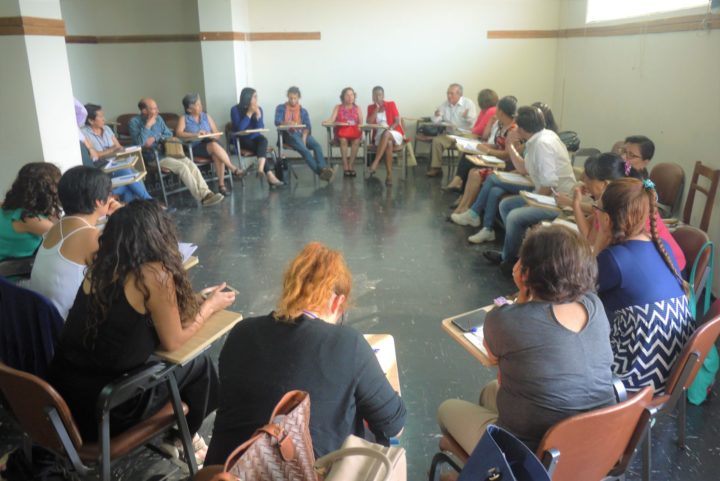Latin America -COPEHU
To give way to this initiative, different educators from various parts of Latin America met virtually to reflect on their current experiences in the midst of the pandemic scenario, and to generate future proposals for rethinking the educational model of today. Under the slogan “Let’s reflect together? The future of education. The human being as the central axis”, the Humanist Pedagogical Current all agreed that they face similar problems and challenges in different countries. The organisation is made up of approximately 80 teachers, professors, teachers, students from different levels and areas of education, as well as parents from Brazil, Argentina, Chile, Peru, Bolivia and Spain.
There were diverse opinions, such as that of Mabel, a teacher from the province of Santa Fe who said: “This situation has brought us closer to home, allowing us to communicate in a different way. But we continue to face impositions from the provincial Ministry of Education, which asks us to systematise the contents. It is difficult to apply what is required by the ministries and to focus on the situations that happen to families. That is why we believe it is more important to focus on the human side, but we are under pressure to work with the programmed content.
While teacher Viviana, a native of Vera who also works in Calchaquí in the north of Santa Fe province, said: “In this situation there were many difficulties, especially being out of the classroom. The teachers are very used to being indoors. It was difficult! However, we in the board had several conversations with our teachers to focus on the work with the student representatives. It is very difficult to deliver the curriculum because in our region the internet connectivity does not work very well. The community where the school is located also does not have access, there is no access to technological tools for everyone. The ways to send the content to the homes were complicated. As for the pedagogical issue, it was complex”.
Therefore, commonalities were identified in the current challenges and difficulties in the context of the pandemic context and the possibilities of moving towards a ‘humanising education’, by empowering the (teaching) vocation, the best virtues and diversity, directed towards a new paradigm where the human being is the central value.
During the meeting several issues were discussed, such as the inhuman situation of Brazilian politics, the contradictions between discourse and institutional pressures in Argentina, particularly in the province of Santa Fe; the priorities of the issues to be dealt with in the crisis caused by the pandemic, the emergence of fear of death in children, a new closeness between families and teachers, the need for internal tools for teachers, the urgency of changing the evaluation criteria and working on accompaniment, the importance of having or reinforcing contact with vocation in teacher training, the ability of educators to oppose institutional pressures, among others.
Romina, who is the director of a kindergarten in the city of Quilmes, in the province of Buenos Aires, affirmed that “our place now is to be close, to contain, to humanise the teaching task. We are going through the same crisis that society is going through. This space to give humanity to teachers is necessary because sometimes they are required to be superheroes.
On the other hand, Luana, an educator from the city of São Paulo, Brazil, said: “We don’t know the tools that everyone has at their disposal. Many of us do very good things, we have to rely on our tools to connect with others. We can think about what we could do to reach out to each country, making exchanges and generating new support for children.
Marcelo, who is a member of the Chilean Teachers’ Association, said that “when we overcome this crisis, we will also have to overcome the other pandemics, such as the economic one, generated by the neoliberal model”. Today we can help people to have a futuristic vision and to think that all is not lost. That this crisis can serve to heal this (education) and other areas, that we have to assist in what we transmit to the students, to our partners, that their pain, and every sacrifice, makes sense at this very moment.
As for Geber, who is an educator from Lima, Peru, she said, “we are looking, as teachers, for ways to generate links. These links are being achieved in different ways, the state has implemented them through television, radio and social networks. One of the problems is that many of us cannot handle all the new technologies. One of the challenges for teachers is to train ourselves in other media.
While Marín, from Madrid, who works as a teacher in the field of early childhood education, agrees that a similar situation exists in her country: “In Spain, the Minister of Education has just established that not so much content should be taught, but that the homework should be reinforcement, and that was a great relief. It’s like being able to pay due attention to what was missing, which is the link. Beyond the pressure of the number of hours we have to dedicate, we continue to prioritise, in a consumerist way, the acquisition of content and not how to advance as human beings. At the cost of what? Being the best in the world?
Through this great exchange, the possibility of reformulating the (teaching) vocation, the educational model and the future with respect to the current situation was highlighted. Different proposals for action were discussed in order to advance the construction of this humanizing education that is so necessary today. The Corriente Pedagógica Humanista (COPEHU) will inform through its social networks of new meetings to deepen these important reflections that were offered and are ready for new contributions.










